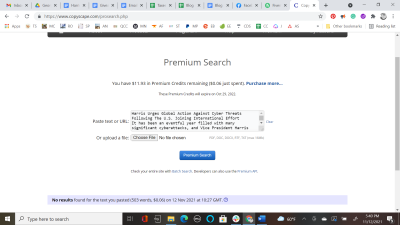(Washington Insider Magazine) -It has been an eventful year filled with many significant cyberattacks, and Vice President Harris called on global leaders on Thursday to come together to combat cybersecurity threats and maintain an open internet.
Earlier today, President Harris had just signed for the United States the Paris Call for Trust and Security in Cyberspace.
Emmanuel Macron, the French president, announced the initiative in 2018. The initiative supports more than 80 countries, dozens of local authorities, public authorities, and private sector organizations. A significant aim of this campaign is to help strengthen global cooperation when it comes to cyber security.
Harris spoke at a panel discussion in Paris about digital and technological challenges.
Harris said, “It is up to all of us to enhance our nations’ security and protect our citizens.” Harris said, “All of us are responsible for realizing the potential of technology and minimizing threats. We must all move forward in an increasingly interconnected, interdependent world.”
President Biden issued an executive order in May to strengthen the federal government’s cybersecurity efforts. As part of Congress’s $1.2 billion infrastructure package, major funding was allocated for cyber risk.
In a recent interview, Harris stated that both he and the Biden-Harris administration were dedicated to working for cyberspace security, stability, and shared prosperity.
The Biden administration has decried foreign nations for the recent attacks they have carried out. In retaliation to the SolarWinds hack that exposed nine federal agencies last year, Vice President Joe Biden imposed sanctions against Russia in April.
According to her, “In cooperation with other nations, our administration has identified those who are responsible for malicious hacking activity.” She firmly believes that every time cyberspace security is threatened, there should be consequences.
Harris had just hours earlier delivered a speech at a separate forum in Paris, in which she called on world leaders to promote equality in the aftermath of the COVID-19 pandemic.
Thursday’s speech was given after announcing Wednesday what the U.S. would do about cybersecurity and space security, addressing climate change, and increasing access to science and technologies engineering education.
Harris was not the only member of the administration to speak publicly about cybersecurity concerns in Europe this week.
As the White House announced it on Wednesday, Anne Neuberger, the deputy national security advisor for cyber and emerging technology, spent three days in Brussels this week meeting with representatives from the European Union, members of the European Parliament, and members of the North Atlantic Council at the North Atlantic Treaty Organization.
As a result of these meetings, international cooperation in countering cyber threats, including ransomware attacks, will be strengthened. I believe this was further confirmed after the attack on the Colonial Pipeline in May and JBS USA, a meat producer, in June.
In a statement issued by Emily Horne (spokeswoman for the White House National Security Council), Neuberger’s visit builds on the Biden administration’s efforts to enhance international cooperation to combat cyber threats.



























